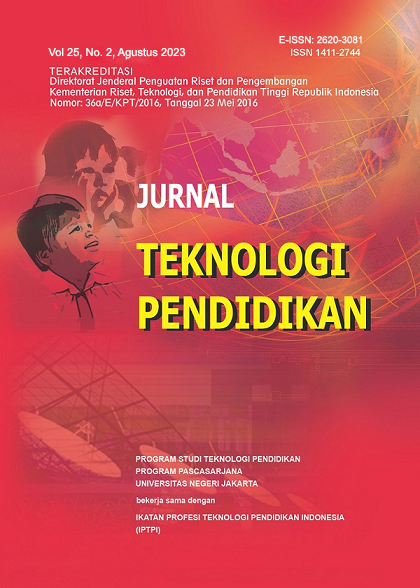Development of Android-Based Gamification Learning Media for Multiplication Material for Grade III Elementary School Students
DOI:
https://doi.org/10.21009/jtp.v25i2.34717Keywords:
gamification, mathematics, multiplication, exercisesAbstract
The lack of practice questions given by the teacher resulted in students having difficulties in operating multiplication. This study aims to produce an android-based gamification application as a medium to support the learning process in operating multiplication material for third grade elementary school students. This development research uses the Rapid Prototyping model. The subjects involved in this study consisted of 2 material experts, 1 instructional design expert, 1 media expert, 3 students for individual trials, 9 students for small group trials, and 15 students for field trials. Data collection methods used are unstructured interviews and questionnaires. The gamification development process is carried out through 5 stages, namely (a) needs analysis and content analysis, (b) determining objectives, (c) building prototypes, (d) utilizing prototypes, (e) system installation and maintenance. The results of the expert review showed improvement, the results of individual trials and small group trials for all aspects received a positive response but there were 3 suggestions for improvement in the small group test, and the results of the field trial of 15 students had achieved a score above the minimum completeness criteria. Based on the results of this analysis, it can be concluded that Android-based gamification media can be used as enrichment for independent learning for third grade elementary school students.
References
Bahrun, S., Alifah, S., & Mulyono, S. (2018). Rancang Bangun Sistem Informasi Survey Pemasaran dan Penjualan Berbasis Object Oriented Programming.
Ernata, Yusvidha. (2017). Analisis Motivasi Belajar Peserta Didik Melalui Pemberian Reward Dan Punishment Di SDN Ngaringan 05 Kec.Gandusari Kab.Blitar. Jurnal Pemikiran dan Pengembangan Sekolah Dasar (JP2SD). 5. 781. 10.22219/jp2sd.vol5.no2.781-790.
Hanifah, R. (2016). Influence of ASTRA Adoption: The Use of Gamification in the Learning Process. [Online]. Available: https://www.researchgate.net/publication/320920734
Hasibuan, C. F., & Sutrisno, S. (2018). PERANCANGAN PRODUK TAS TRAVEL MULTIFUNGSI DENGAN MENGGUNAKAN METODE QUALITY FUNCTION DEPLOYMENT (QFD). Jurnal Sistem Teknik Industri, 19(1), 40-44. https://doi.org/10.32734/jsti.v19i1.365.
Ismail, I., & Albahri, F.P. (2019). Perancangan E-Kuisioner menggunakan CodeIgniter dan React-Js sebagai Tools Pendukung Penelitian. J-SAKTI (Jurnal Sains Komputer dan Informatika).
Juwantara, R.A. (2019). Analisis Teori Perkembangan Kognitif Piaget pada Tahap Anak Usia Operasional Konkret 7-12 Tahun dalam Pembelajaran Matematika. Al-Adzka: Jurnal Ilmiah Pendidikan Guru Madrasah Ibtidaiyah.
Kartikasari, A.R., & Rahmawati, I. (2018). Pengembangan Media Game Moou Train Berbasis Android pada Mata Pelajaran Matematika Materi Perkalian untuk Siswa Kelas III SD.
Lister, M. (2015). Gamification: The effect on student motivation and performance at the post-secondary level. Issues and Trends in Educational Technology, 3.
Mengobarkan api matematika. (2017). (n.p.): CV Jejak (Jejak Publisher).
Muchlis, M., Christian, A., & Sari, M. P. (2019). Kuesioner Online Sebagai Media Feedback Terhadap Pelayanan Akademik pada STMIK Prabumulih. Jurnal Eksplora Informatika, 8(2), 149-157. https://doi.org/10.30864/eksplora.v8i2.215.
Nasution, S., & Sutapa, P. (2020). Strategi Guru dalam Menstimulasi Keterampilan Motorik AUD Pada Era Pandemi Covid 19. Jurnal Obsesi : Jurnal Pendidikan Anak Usia Dini, 5(2), 1313-1324. doi:https://doi.org/10.31004/obsesi.v5i2.849.
Nuryati, N., & Darsinah, D. (2021). Implementasi Teori Perkembangan Kognitif Jean Piaget dalam Pembelajaran Matematika di Sekolah Dasar. Jurnal Papeda: Jurnal Publikasi Pendidikan Dasar.
Pranatawijaya, V.H., Widiatry, W., Priskila, R., & Putra, P.B. (2019). Penerapan Skala Likert dan Skala Dikotomi Pada Kuesioner Online. Journal of Systems Integration, 5, 128-137. doi: 10.34128/jsi.v5i2.185.
Priatna, T., Baihaqi, W., Rahman, A. A., & Sunarya, Y. (2020). Reformulation of Teachers' Duties and Functions to Face the Challenges of Education in the Industrial Revolution Era 4.0.
Putria, H., Maula, L. H., & Uswatun, D. A. (2020). Analysis of the Online Learning Process (online) During the Covid-19 Pandemic in Elementary School Teachers. Basicedu Journal, 4(4), 861–870. doi: 10.31004/basicedu.v4i4.460.
Rivera, E.S., & Garden, C.L. (2021). Gamification for student engagement: a framework. Journal of Further and Higher Education, 45, 999 - 1012.
Senarai Penelitian Pendidikan, Hukum, dan Ekonomi di Sulawesi Tenggara. (2018). (n.p.): Deepublish.
Simon, M.A. (2019). Analyzing Qualitative Data in Mathematics Education. Research in Mathematics Education.
Supandi, A., Sahrazad, S., Nugroho Wibowo, A., & Widiyarto, S. (2020). Proceedings Of Samasta National Seminar On Indonesian Language And Literature Teacher Competency Analysis: Learning Revolution Industry 4.0.
Victo, R. (2020). Applying Math Into Music. Buana Popular Science.
Wati, I., & Kamila, I. (2019). The Importance Of Professional Teachers In Educating Millennial Students To Face Revolution 4.0.
Downloads
Published
How to Cite
Issue
Section
License
Jurnal Teknologi Pendidikan is an Open Access Journal. The authors who publish the manuscript in Jurnal Teknologi Pendidikan agree to the following terms.
Attribution-ShareAlike 4.0 International (CC BY-SA 4.0)
-
Attribution — You must give appropriate credit, provide a link to the license, and indicate if changes were made. You may do so in any reasonable manner, but not in any way that suggests the licensor endorses you or your use.
-
ShareAlike — If you remix, transform, or build upon the material, you must distribute your contributions under the same license as the original.
- No additional restrictions — You may not apply legal terms or technological measures that legally restrict others from doing anything the license permits.
Notices:
- You do not have to comply with the license for elements of the material in the public domain or where your use is permitted by an applicable exception or limitation.
- No warranties are given. The license may not give you all of the permissions necessary for your intended use. For example, other rights such as publicity, privacy, or moral rights may limit how you use the material.








